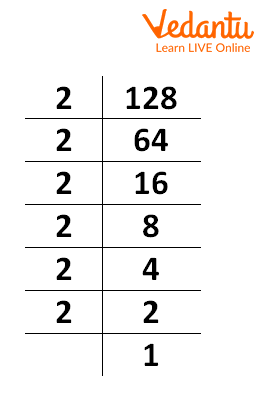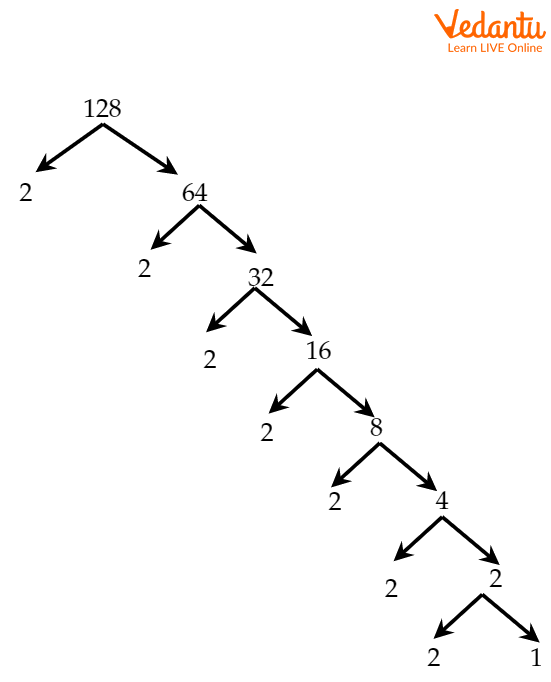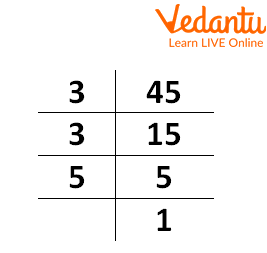




What Are the Factors and Prime Factors of 128?
Factors of a number are defined as the integers that completely and evenly divide the given number without leaving any remainder. We can write a given number into a product of its factors. This is known as the factorization of a number. The factors are the numbers that are always smaller than or equal to the given number and divide the number without leaving a remainder.
What is a Factor?
A factor of a number is a number other than a given number that divides the given number without leaving any remainder. It means we can multiply finite copies of a factor together to get the original number. For example, 2 is divisible by both 1 and 2. So, the factors of 2 are 1 and 2.
How to Find Factors of 128?
The given number is 128, we know there are at least two factors of the number 1 and the number itself. So, two of the factors of 128 are 1 and 128. To find the remaining factors, we divide 128 by 2, 3, 4,… till 127 (as the factors are always less than 128). We know that 128 is divisible by 2, the remainder is zero and we get the quotient 64. So, 2 and 64 are the factors of 128. Next, we need to check upto 64 only. After 2, we find that 4 divides 128 exactly with the quotient of 32. So, 4 and 32 are also the factors of 128. Next, we get 8 and 16 as factors of 128 and no other number divides 128 exactly. Hence, we get the factors of 128 as 1, 2, 4, 8, 16, 32, 64, and 128.
If we consider 128 as an integer, then the factors of 128 will include both positive and negative factors as 1, -1, 2, -2, 4, -4, 8, -8, 16, -16, 32, -32, 64, -64, 128, and -128.
Prime Factors of 128
Prime numbers are the numbers having only two factors, i.e., 1 and the number itself. The factors of 128 are 1, 2, 4, 8, 16, 32, 64, and 128. Here, the only prime is 2. Therefore, 2 is the only prime factor of 128.
Prime Factorization of 128
In order to find the prime factorization of 128, find the prime factors of 128. Recall that Prime Factors are the numbers that have only two factors 1 and the number itself. From the factors of 128, the prime number is 2 only.
So, the prime factor of 128 is 2.
Now, we see that $2^7=128$ and 2 is a prime number. So, Prime Factorization of 128 is
$2\times2\times2\times2\times2\times2\times2$.
We can do this in another way:
Start from 2(prime number). Is 128÷2? YES.
Write 2 to the left of 128 and 128÷2, i.e., 64 below 128.
Next, do it for 64. Continue till we get 1 at the end.

Prime Factorization of 128
Now, write the numbers in the left column in the form of multiplication as $128=2\times2\times2\times2\times2\times2\times2$.
This is the prime factorization of 128.
This can also be written as $128=2^7$ (Exponential Form).
If we consider 128 as an integer, then we can write the prime factorization of 128 as $(-2)^6 \times 2 $ or $ -(-2)^7$. Other factorizations are possible in this case.
Prime Factorization of 128 Using Factor Tree
Factor trees are a way of expressing the factorization of a number in terms of its prime factors. It uses repeated division by prime numbers to get the prime factorization.
All the branches of the tree are split into factors. When the factors at the end are prime numbers, we stop and the numbers at the end are prime factors. Writing them in multiplicative form gives a prime factorization of 128 using a factor tree.
We start dividing the number by prime numbers and write the number and the quotient as the branches of the tree. This process is repeated till we get all the prime numbers at the end.

Factor Tree of 128
Here, the last row contains 2’s only (prime numbers).
So, the prime factorization of 128 is $2\times2\times2\times2\times2\times2\times2$.
Factors of 128 in Pairs
To write all the factors of 128 in pairs, we see that
$1\times128=128$
$2\times64=128$
$4\times32=128$
$8\times16=128$
$-1\times (-128)=128$
$-2\times (-64)=128$
$-4\times(-32)=128$
$-8\times (-16)=128$
So, writing the numbers on the left-hand side in pairs, we get (1,128), (2,64), (4,32), (8,16), (-1,-128), (-2,-64), (-4,-32), (-8,-16) and these are the factors of 128 in pairs.
Number of Factors of 128
If the prime factorization of N is in form \[N{\rm{ }} = {X^a}{y^b}{z^c}\], then the number of positive factors is \[\left( {a + 1} \right)\left( {b + 1} \right)\left( {c + 1} \right)\].
The prime factorization form of 128 is \[{2^7}\].
The number of positive factors of 128 is \[7 + 1 = 8\].
The number of negative factors in a number is the same as the number of positive factors in a number.
The total number of factors of 128 is 8+8 =16.
Solved Problem
1. What is the sum of all positive factors of 128?
Solution:
The factors of 128 are 1, 2, 4, 8, 16, 32, 64, and 128.
The sum of the factors is 1+2+4+8+16+32+64+128 = 255
2. Find the prime factors of 45.
Solution:

Prime Factorization 45
The prime factorization form of 45 is $3\times 3\times 5$.
Thus, the prime factors of 45 are 3 and 5.
Practice Questions
1. Find the prime factors of 65.
Answer: The prime factors are 5 and 13.
2. What is the prime factorization of 28?
Answer: The prime factorization of 28 is \[2^{2}\times 7\].
Key Features
To find the factors of 128, we can use a factor tree.
The factors of 128 are 1, 2, 4, 8, 16, 32, 64, and 128 and their negative counterparts.
The factor pairs of 128 are (1,128), (2,64), (4,32), (8,16), (-1,-128), (-2,-64), (-4,-32), and (-8,-16).
Interesting Facts
A composite number is never a prime number.
If a number has more than two positive factors, it is a composite number.
FAQs on Factors of 128 Explained With Easy Steps and Examples
1. What is the prime factorization of 128, and how is it found using the division method?
The prime factorization of 128 is 2 × 2 × 2 × 2 × 2 × 2 × 2, or 27. To find this using the division method, you continuously divide 128 by the smallest prime number, which is 2, until you reach 1.
The steps are as follows:
- 128 ÷ 2 = 64
- 64 ÷ 2 = 32
- 32 ÷ 2 = 16
- 16 ÷ 2 = 8
- 8 ÷ 2 = 4
- 4 ÷ 2 = 2
- 2 ÷ 2 = 1
2. How do you represent the factorization of 128 using a factor tree?
A factor tree for 128 starts by breaking it into a pair of factors, like 2 and 64. You then continue to break down the composite numbers until all branches end in a prime number. For 128, every branch will eventually lead to the prime number 2. For example: 128 branches into 2 and 64; 64 branches into 2 and 32; 32 branches into 2 and 16, and so on, until you are left with seven 2s.
3. What are all the positive factors of 128?
The positive factors of 128 are all the numbers that divide it without leaving a remainder. By using the prime factorization (27), we can find all combinations. The factors of 128 are 1, 2, 4, 8, 16, 32, 64, and 128.
4. How does understanding the difference between prime and composite numbers help in the factorization of 128?
Understanding the difference is fundamental. A composite number, like 128, is a number that has more than two factors. The goal of prime factorization is to break down this composite number into its essential building blocks, which are prime numbers (numbers with only two factors: 1 and themselves). For 128, the only prime building block is 2. This process confirms that 128 is a composite number made up exclusively of the prime factor 2.
5. Is 128 a perfect square or a perfect cube? How does its prime factorization prove this?
No, 128 is neither a perfect square nor a perfect cube. Prime factorization helps us determine this:
- A number is a perfect square if all the exponents in its prime factorization are even.
- A number is a perfect cube if all the exponents in its prime factorization are multiples of 3.
6. How many factors does 128 have, and can you find this total without listing them all out?
Yes, there is a shortcut. The number 128 has a total of 8 factors. You can find this using its prime factorization, which is 27. The rule is to take the exponent of the prime factor (in this case, 7) and add 1 to it. So, the total number of factors is (7 + 1) = 8. This method works for any number once you have its prime factorization.





































